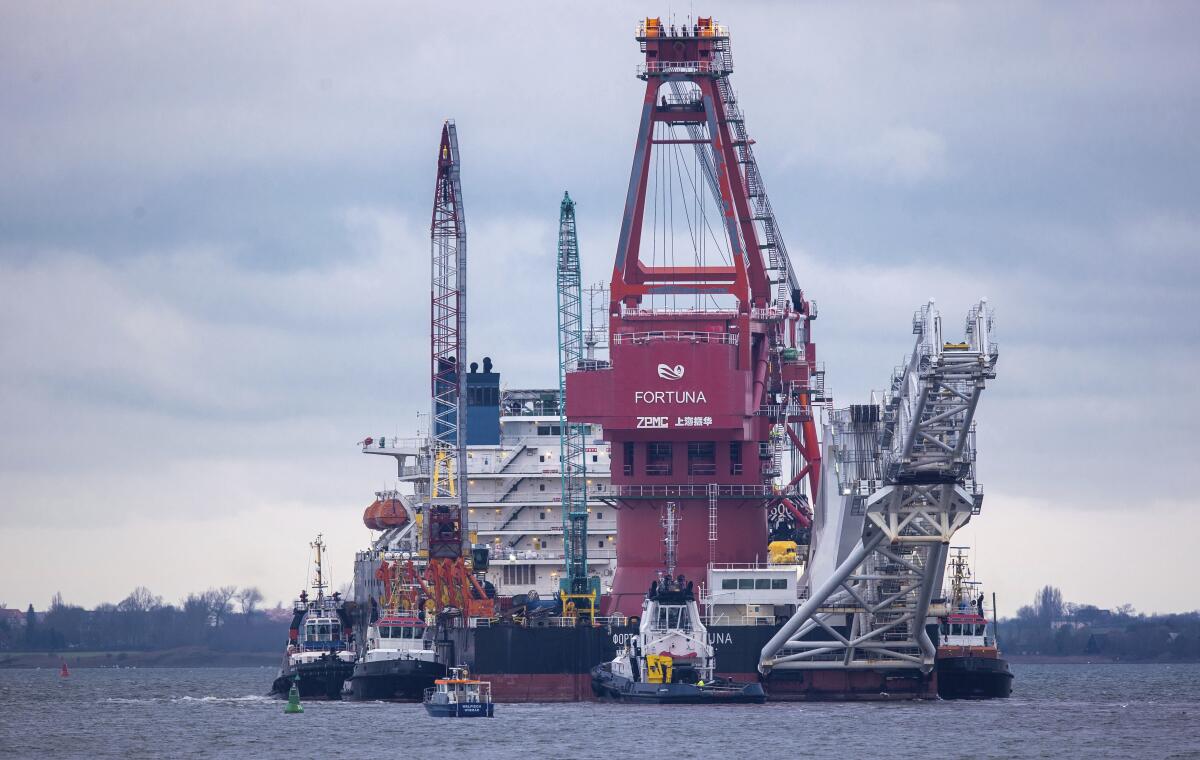Op-Ed: Threaten Russia where it will hurt: Curb its gas and oil sales to Europe

The Biden administration declared Wednesday that if Russia invades Ukraine, the nearly completed Nord Stream 2 gas pipeline from Russia to Germany would be blocked. On Thursday, German officials said the project could face sanctions if Russia attacks. This threat is an overdue policy change in dealing with Vladimir Putin’s aggression. But the administration and European leaders need to go much further.
The Nord Stream 2 project, which runs below the Baltic Sea, is designed to allow Russia to double its natural gas exports to Germany and the rest of Western Europe along this route, which circumvents Ukraine and other countries that might interrupt the flow. What matters to Russia is money, and its great vulnerability is its heavy dependence on energy revenues. Energy revenues now account for nearly 60% of all the goods and services the country sells abroad.
Until now, however, the U.S. and European countries, worried about disrupting energy supplies to Europe, have largely kept the energy sector out of the sanctions discussion. That’s understandable since Russia supplies more than 40% of the European Union’s natural gas imports. However, placing sanctions on Russia’s energy exports could be one of the most effective hammers against the Putin regime.
But it’s not enough to threaten Russia with reductions in future revenue that it has not yet even begun to enjoy. And, even now, Russia is not using the full capacity of its existing export pipelines. Putin thinks he has a strong hand to play because the West lacks both a plan and the willingness to cut its dependence on Russian energy supplies. It’s time to prove him wrong.
It will be hard to have a quick impact, of course, because Russia has a grip on European gas supplies and is one of the world’s lowest cost producers of oil and gas. That’s why an effective sanctions policy must begin with a credible schedule for phasing down Russian imports specifically — it must squeeze the demand for Russian exports while also ending access to Western technology Russia often needs for its supplies. So far, that hasn’t been articulated, and any long-term pain for Russia appears too abstract.
To loosen Russian control on the natural gas market, European governments need to employ a diverse set of tools. Much stronger use of antitrust actions could help erode Russia’s ability to earn high profits from its Western sales. When those markets are tight, as they are today, Russia can withhold supplies to drive up prices, which brings in more revenue to finance Russian campaigns of aggression. Cutting access to technology needed for exporting gas as a liquid via tanker, an area of tremendous growth potential for Russia, will help too.
Over the short term, Europe would also benefit from having more diverse supplies of gas from beyond the continent. This will mean providing government subsidies to European imports of gas by ship, such as from the U.S. and the Persian Gulf, and bigger subsidies for greener energy alternatives.
Reviving the idea of a single European gas buyer — who could make sure that what Europe buys doesn’t come from Russia — is overdue and would be politically more viable with the shock of a Ukrainian invasion. The plan and financing should be coordinated through the European Union and NATO to underscore that this is a common security need for the West as a whole. Ironically, to get through this crisis and put more pressure on Russia will require encouraging new development of gas sources at a time when Europe is trying to cut consumption of conventional fossil fuels.
Over the longer term, Europe has to cut its reliance on hydrocarbons, which it is starting to do. That process needs to be accelerated, as a matter of national security, not just climate policy. This means making bigger investments in alternatives to conventional natural gas, including hydrogen.
In tandem with actions on gas, the Western allies need a united front in cutting oil imports from Russia. While oil is a global commodity and chaos in oil markets when prices are already high would be unwelcome, a long-term plan for cutting imports could focus the pain on Russia while sending clearer signals to the global market. Tighter controls over access to the Western banking system will make Russia a financial pariah, which will drive up its costs of doing business.
Moscow needs to recognize that escalation in Ukraine will severely damage its economic fortunes. Right now, that lesson hasn’t been delivered emphatically enough.
Threatening to block the Nord Stream 2 pipeline is a start, but won’t have much effect on its own. To make it serious, we need to form a credible plan to get us all, including the United States, off Russian oil and gas (even by paying subsidies to consumers). We should do that now to improve our deterrent posture rather than after Russian tanks roll through Ukraine.
Michael O’Hanlon is a senior fellow at the Brookings Institution. David Victor is a professor at UC San Diego and a non-resident senior fellow at Brookings.
More to Read
A cure for the common opinion
Get thought-provoking perspectives with our weekly newsletter.
You may occasionally receive promotional content from the Los Angeles Times.










